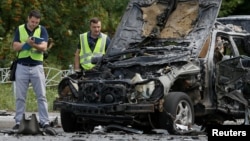Colonel Maksym Shapoval, head of Special Operations for Ukraine’s Military Intelligence branch, was killed Tuesday morning by an explosive device planted in his car.
“The incident has been classified as a terrorist act,” an official statement on the Ministry of Defense website read. “All circumstances of the tragedy are currently being established.”
A security camera in a nearby building caught the explosion on video.
A source in law enforcement told the Kyiv news site LB.ua that Shapoval may have been killed in response to his espionage work in the Russian-occupied territories in Ukraine’s Donbas region.
According to the source, Shapoval was involved in the planning of and participated in raids behind enemy lines to find evidence of Russian military involvement in Ukraine. The source alleged that Shapoval may have been targeted for this reason.
According to Mark Galeotti, an expert on Russian organized crime and intelligence agencies, the bombing may indeed be linked to Moscow.
“In the 1990s, the car bomb was one of the Russian mafia's weapons of choice; since then, the Russian state has adopted it, such as for the assassination of Chechen rebel leader Zelimkhan Yandarbiev in Qatar in 2004,” Galeotti said.
“Now," he added, "Russia seems to have adopted the car bomb as both a way of eliminating inconvenient rebel warlords in the Donbas — such as Arsen 'Motorola' Pavlov in 2016 — to spreading terror in Ukraine.”
Galeotti suggested, however, that the real motives for the assassination may not be as straightforward.
“Of course, in Ukraine things are rarely straightforward, and the worlds of business, crime, Ukrainian politics and Russian subversion often intersect,” he said.
Shapoval is the second high profile officer to have been killed by a car bomb in three months. In late March, a car bomb claimed the life of Lt. Colonel Oleksandr Kharaberiush, a counterintelligence agent of the SBU, Ukraine’s intelligence agency, in Mariupol.
Last year, a car bomb killed Belarusian-born Russian journalist Pavel Sheremet in Kyiv. Sheremet was a well-known critic of both the Russian and Belarusian governments, as well as the Ukrainian government.
While the official investigation into the Sheremet bombing has revealed nothing so far, an independent investigation found evidence implicating former members of Ukraine’s security service in the assassination.
Apart from car bombings, Kyiv also has seen two high profile assassinations since 2017. In February a man shot and killed Denis Voronenkov, an ex-member of Russia’s State Duma, who had fled to Ukraine and had offered to testify in court against Ukrainian ex-President Viktor Yanukovych. The shooter was later identified as a veteran of Ukraine’s National Guard.
On June 1, a man posing as a journalist shot Adam Osmayev, leader of a pro- Ukrainian Chechen battalion in Kyiv’s Podil district. Osmayev’s wife, Amina Okuyeva, returned fire with a pistol she had been given as an award. Osmayev made a full recovery. Authorities later established that the would-be assassin was a Russian national who had obtained a Ukrainian passport.
In addition to Ukrainian military and intelligence personnel, leaders of pro- Russian militia groups in the occupied territories also have been assassinated via car bombs, mines, or other explosive devices.
In early February militia leader Mikhail “Givi” Tolstykh was killed in his office by a thermobaric rocket fired from an undetermined distance. Authorities of the self-proclaimed “Donetsk People’s Republic” blamed Ukrainian special forces for the attack, but those on both sides of the front strongly suspect Russia’s intelligence services of organizing the assassination.





